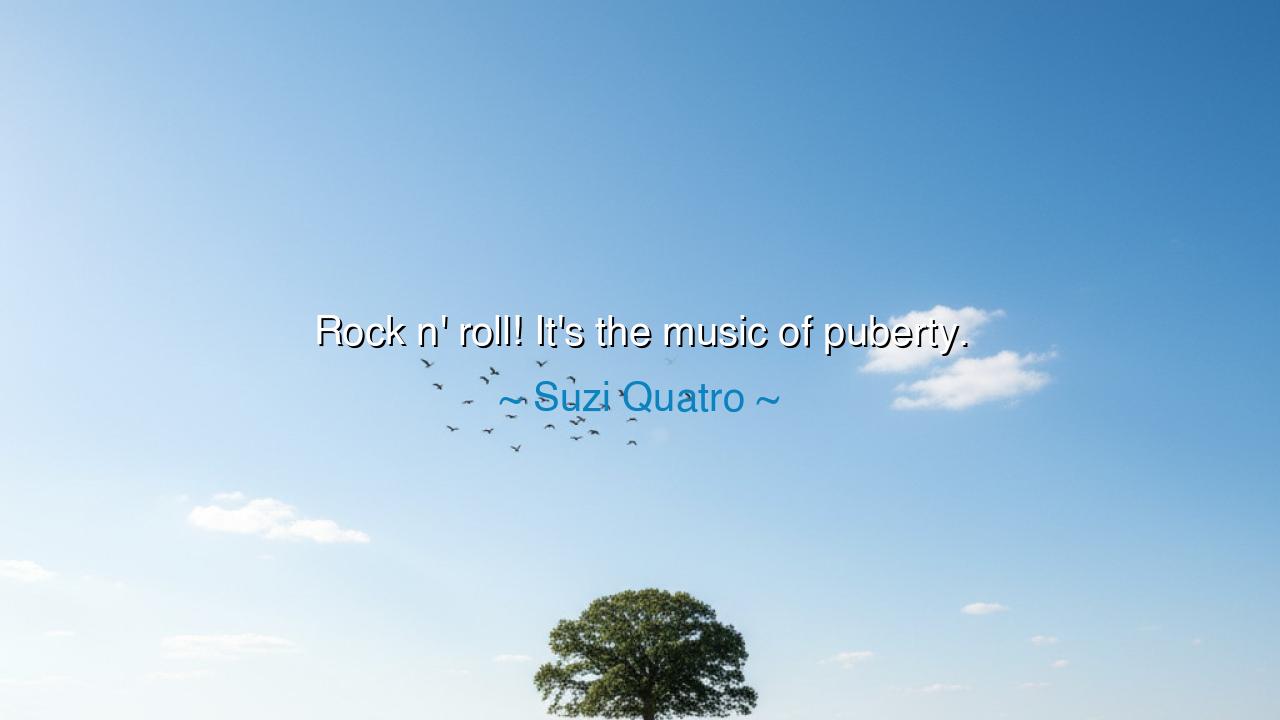
Rock n' roll! It's the music of puberty.






“Rock n’ roll! It’s the music of puberty.” Thus declared Suzi Quatro, the warrior-queen of the bass guitar, whose voice thundered through amplifiers and whose spirit shattered the old molds of what music—and women in music—could be. Her words are not to be taken lightly, for they strike at the heart of transformation itself. In calling rock n’ roll the music of puberty, she names it as the anthem of change, rebellion, awakening, and the fire that burns when the soul first discovers its own power.
In the ancient teachings, the time of youth was always seen as sacred. It was the crossing from childhood into the arena of adulthood, the trembling stage where innocence breaks and strength is born. Just as the chrysalis must tear itself apart for the butterfly to emerge, so must the young endure the chaos of puberty—the storm of identity, desire, and defiance. And what sound could match such upheaval but the pounding drums, the screaming guitars, the untamed roar of rock n’ roll? It is not refined music, nor does it pretend to be; it is raw, like the spirit of a youth who refuses to be caged.
Suzi Quatro herself embodied this truth. In the 1970s, when the world believed that women should stand quietly at the mic, strumming or singing sweetly, she strapped on her bass, donned leather, and shook the stage with thunder. She defied the “rules” of the music world with the same energy that a teenager defies the rules of their parents. Her rock n’ roll was not polished—it was primal, the very sound of identity being forged in the furnace of defiance. Her words remind us that the music of youth is not about perfection but about the honest, unrefined cry of becoming.
History itself shows us the same spirit. In the 1950s, Elvis Presley was condemned by elders who saw his swiveling hips and guitar riffs as dangerous, even immoral. But to the young, his music was revelation. It gave voice to their longing, their confusion, their hunger to break free from the rigid mold of their parents’ world. Just as Suzi Quatro declared, rock n’ roll became the sound of puberty, not only in the flesh but in the soul of an entire generation. It was a collective coming-of-age, expressed through music that was wild, new, and untamed.
What is the teaching here? It is that each age of life has its music, and each music has its meaning. Rock n’ roll belongs to the time of awakening because it gives permission to break, to clash, to scream, and to dance in ways that no longer fit the childhood mold. It tells the youth: “Your restlessness is holy. Your rebellion is sacred. Your voice, though raw, is powerful.” It is not about soothing the soul, but about igniting it, about teaching it to burn with its own light.
Therefore, O listener, remember that chaos is not your enemy, but the herald of change. Just as rock n’ roll taught generations to embrace the turbulence of becoming, so too should you embrace the storms in your own seasons of life. When the ground shifts beneath you, when the old ways no longer fit, do not curse the noise—dance to it. Let it shape you, let it sharpen you, let it reveal the strength you never knew you carried.
In your own days, learn from this teaching: find the music that matches your moment. In your youth, let the untamed rhythms guide your courage. In your trials, seek the sound that steadies your heart. In your victories, embrace the melodies of triumph. Do not fear when life’s music grows loud and wild, for like rock n’ roll, it may be the cry of your own spirit announcing its transformation.
Thus Suzi Quatro’s words endure: “Rock n’ roll! It’s the music of puberty.” It is the battle-cry of youth, the soundtrack of transformation, the eternal rhythm of becoming. Honor it, and honor every season’s music in your life, for in each sound is a teaching, and in each teaching, a doorway to freedom.






AAdministratorAdministrator
Welcome, honored guests. Please leave a comment, we will respond soon